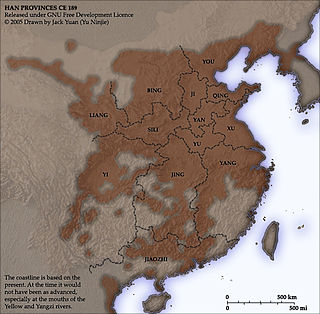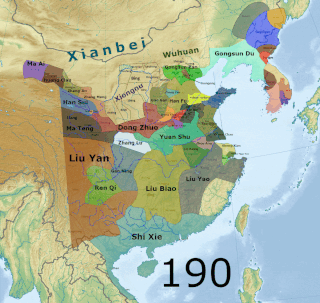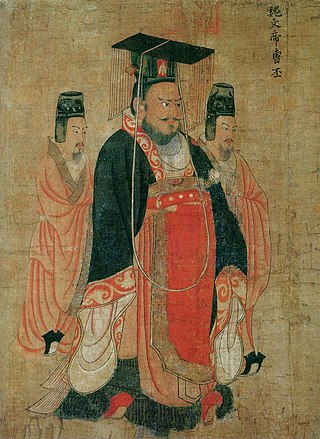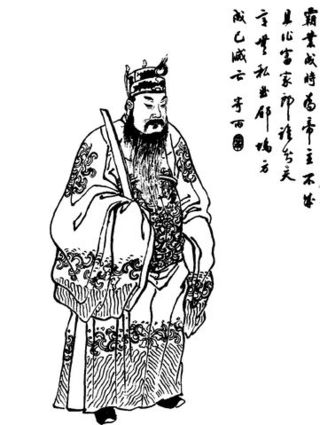Related Research Articles
The 180s decade ran from January 1, 180, to December 31, 189.

Year 189 (CLXXXIX) was a common year starting on Wednesday of the Julian calendar. At the time, it was known as the Year of the Consulship of Silanus and Silanus. The denomination 189 for this year has been used since the early medieval period, when the Anno Domini calendar era became the prevalent method in Europe for naming years.

The Three Kingdoms from 220 to 280 AD was the tripartite division of China among the dynastic states of Cao Wei, Shu Han, and Eastern Wu. The Three Kingdoms period was preceded by the Eastern Han dynasty and was followed by the Western Jin dynasty. The short-lived state of Yan on the Liaodong Peninsula, which lasted from 237 to 238, is sometimes considered as a "4th kingdom".

Cao Pi, courtesy name Zihuan, was the first emperor of the state of Cao Wei in the Three Kingdoms period of China. He was the second son of Cao Cao, a warlord who lived in the late Eastern Han dynasty, but the eldest son among all the children born to Cao Cao by his concubine, Lady Bian. According to some historical records, he was often in the presence of court officials in order to gain their support. He was mostly in charge of defence at the start of his career. After the defeat of Cao Cao's rival Yuan Shao at the Battle of Guandu, he took Yuan Xi's widow, Lady Zhen, as a concubine, but in 221 Lady Zhen died and Guo Nüwang became empress.

Sun Jian (155–191?), courtesy name Wentai, was a Chinese military general, politician, and warlord who lived during the late Eastern Han dynasty of China. He allied himself with Yuan Shu in 190 when warlords from eastern China formed a coalition to oust Dong Zhuo, a tyrannical warlord who held the puppet Emperor Xian in his power. Although he controlled neither many troops nor much land, Sun Jian's personal bravery and resourcefulness were feared by Dong Zhuo, who placed him among Yuan Shao, Yuan Shu and Liu Biao as the most influential men at that time. After the coalition disbanded in the next year, China fell into civil war. In 191, Sun Jian was killed in battle during an offensive campaign against Liu Biao.

Emperor Ling of Han, personal name Liu Hong, was the 12th and last powerful emperor of the Eastern Han dynasty. Born the son of a lesser marquis who descended directly from Emperor Zhang, Liu Hong was chosen to be emperor in February 168 around age 12 after the death of his predecessor, Emperor Huan, who had no son to succeed him. He reigned for about 21 years until his death in May 189.
Liu Bian, also known as Emperor Shao of Han and the Prince of Hongnong, was the 13th emperor of the Eastern Han dynasty in China. He became emperor around the age of 13 upon the death of his father, Emperor Ling, and ruled briefly from 15 May to 28 September 189 before he was deposed, after which he became known as the "Prince of Hongnong". His emperor title, "Emperor Shao", was also used by other emperors who were in power for very short periods of time. In March 190, he was poisoned by Dong Zhuo, the warlord who deposed him and replaced him with his younger half-brother, Liu Xie.

Emperor Xian of Han, personal name Liu Xie (劉協), courtesy name Bohe, was the 14th and last emperor of the Eastern Han dynasty in China. He reigned from 28 September 189 until 11 December 220.

Dong Zhuo, courtesy name Zhongying, was a Chinese military general, politician, and warlord who lived in the late Eastern Han dynasty. At the end of the reign of the Eastern Han, Dong Zhuo was a general and powerful minister of the imperial government. Originally from Liang Province, Dong Zhuo seized control of the imperial capital Luoyang in 189 when it entered a state of turmoil following the death of Emperor Ling of Han and a massacre of the eunuch faction by the court officials led by General-in-Chief He Jin.

Yuan Shao, courtesy name Benchu (本初), was a Chinese military general, politician, and warlord who lived in the late Eastern Han dynasty. He occupied the northern territories of China during the civil wars that occurred towards the end of the Han dynasty. He was also an elder half-brother of Yuan Shu, a warlord who controlled the Huai River region, though the two were not on good terms with each other.

He Jin, courtesy name Suigao, was a Chinese military general and politician. He was the military Grand Marshal and regent of the late Eastern Han dynasty of China. He was an elder half-brother of Empress He, and a maternal uncle of Emperor Shao. In 189, he and his sister shared power as regents when the young Emperor Shao was put on the throne following Emperor Ling's death. During the time, the conflict between He Jin and the influential eunuch faction intensified. The eunuch faction lured He Jin into a trap in the imperial palace and assassinated him. While He Jin's subordinates, led by the warlord Yuan Shao, slaughtered the eunuch faction in revenge, the warlord Dong Zhuo took advantage of the power vacuum to enter the imperial capital Luoyang and seize control of the Han central government. Dong Zhuo's seizure of control and the subsequent breakdown of central command that followed brought forth the beginning of massive civil wars that lasted for nearly a century, during which time the Han dynasty came to an end and the Three Kingdoms period began in its place.
Empress He, personal name unknown, posthumously known as Empress Lingsi, was an empress of the Eastern Han dynasty. She was the second empress consort of Emperor Ling and the mother of Emperor Shao. After the death of Emperor Ling in 189, she became empress dowager when her young son, Liu Bian, became the new emperor. She was caught up in the conflict between her brother, General-in-Chief He Jin, and the eunuch faction, who were both vying for power in the Han imperial court. After He Jin's assassination and the elimination of the eunuch faction, the warlord Dong Zhuo took advantage of the power vacuum to lead his forces into the imperial capital and seize control of the Han central government. Dong Zhuo subsequently deposed Emperor Shao replaced him with Liu Xie and had Empress Dowager He poisoned to death.

Ding Yuan, courtesy name Jianyang, was a Chinese politician and warlord who lived during the late Eastern Han dynasty of China. In 189, both he and Dong Zhuo were summoned into the capital Luoyang with their individual troops to assist in the struggle against the powerful eunuch faction. However, Ding Yuan was eventually killed by his trusted aide Lü Bu, who had been bought over by Dong Zhuo.
The Ten Attendants, also known as the Ten Eunuchs, were a group of influential eunuch-officials in the imperial court of Emperor Ling in Eastern Han China. Although they are often referred to as a group of 10, there were actually 12 of them, and all held the position of zhong changshi in Emperor Ling's imperial court.
Empress Dowager Dong, personal name unknown, formally known as Empress Xiaoren, was an empress dowager of the Eastern Han dynasty of China. She was never empress throughout her early life because she was the wife of a marquis; she only became empress dowager because her son, Liu Hong, became the emperor by chance. During her son's reign, she developed a rivalry with her daughter-in-law, Empress He, because she wanted Emperor Ling's younger son, Liu Xie, to be crown prince while Empress He wanted her own son, Liu Bian to succeed his father. Emperor Ling died in May 189 before he managed to designate either of his two sons as crown prince. Liu Bian eventually took the throne as Emperor Shao; Empress Dowager Dong, as the emperor's grandmother, became grand empress dowager, while her daughter-in-law became empress dowager. Empress Dowager He eventually conspired with her brother, General-in-Chief He Jin, to unseat her mother-in-law from power. Grand Empress Dowager Dong died of illness shortly after her downfall; the common people held Empress Dowager He and her family responsible for the grand empress dowager's death.

The end of the Han dynasty was the period of Chinese history from 189 to 220 CE, roughly coinciding with the tumultuous reign of the Han dynasty's last ruler, Emperor Xian. During this period, the country was thrown into turmoil by the Yellow Turban Rebellion (184–205). Meanwhile, the Han Empire's institutions were destroyed by the warlord Dong Zhuo and fractured into regional regimes ruled by various warlords, some of whom were nobles and officials of the Han imperial court. One of those warlords, Cao Cao, was gradually reunifying the empire, ostensibly under Emperor Xian's rule; the Emperor and his court were actually controlled by Cao Cao himself, who was opposed by other warlords.
Cao Teng, courtesy name Jixing, was a eunuch who lived during the Eastern Han dynasty of China. He served four Han emperors. Through his adopted son Cao Song, he was the grandfather of Cao Cao, who laid the foundations for the state of Cao Wei in the Three Kingdoms period. In 220, upon the establishment of Wei by Cao Cao's son Cao Pi, Cao Teng was posthumously honoured as "Emperor Gao of Wei" (魏高帝), becoming the only eunuch in Chinese officialdom to have this honor.
Cao Jie, courtesy name Hanfeng, was a Chinese court eunuch and politician during the Eastern Han dynasty. He rose to power during the reign of Emperor Ling. He was involved in a power struggle against a rival faction led by Dou Wu and Chen Fan during the reign of Emperor Huan and early reign of Emperor Ling. His son-in-law Feng Fang later became one of the 8 colonels of the Army of the Western Garden.
Zhu Youqian, né Zhu Jian (朱簡), known as Li Jilin (李繼麟) from 923 to 926, courtesy name Deguang (德光), formally the Prince of Xiping (西平王), was a Chinese military general, monarch, politician, and warlord of the late Chinese dynasty Tang Dynasty and the first two dynasties of the subsequent Five Dynasties and Ten Kingdoms period, Later Liang and Later Tang, ruling Huguo Circuit during most of that time. Both he and his family were extremely honored by Emperor Zhuangzong of Later Tang, but later, he was falsely accused of plotting a rebellion, and Emperor Zhuangzong put him and his entire family to death.
The Army of the Western Garden was an army established in 188 CE during the reign of Emperor Ling in the Eastern Han Dynasty.
References
- ↑ Emperor Ling's biography in Book of the Later Han indicated that Jian Shuo died soon after Liu Bian ascended the throne, which took place on the wuwu day of the 4th month of the 6th year of the Zhong'ping era (15 May 189 on the Julian calendar). Thus, Jian likely died in May 189.
- de Crespigny, Rafe (2007). A Biographical Dictionary of Later Han to the Three Kingdoms 23-220 AD. Leiden: Brill. ISBN 9789004156050.
- Fan, Ye (5th century). Book of the Later Han (Houhanshu).